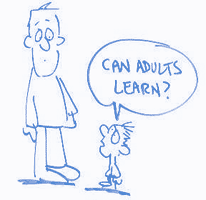

|
Anyone can learn or accomplish anything. Until fairly recently it was generally believed that people were genetically endowed with a certain amount of intelligence and talent at conception or birth and that this did not change fundamentally during their lives. It was also thought that brain neurons did not change after we reached adulthood. However, the sciences of neuroscience and social psychology started to produce massive evidence that these ideas were not the case.
Instead it turned out that most people are able to learn anything they put their mind to learn and accomplish anything they put their mind to accomplish if they were only willing to put in sufficient effort.
Of course the idea that you can do or be anything does not account for the many strange things children might want to do or be that are simply impossible or completely lacking in ambition.
It should be self evident, however, that effort and hard work are necessary to accomplish anything if that thing is to have any worth. Self belief is important but only in so far as it motivates us to make an effort and work hard. Similarly anything can be learned but again only with sufficient effort and hard work.
It also turned out that our neurons changed and grew all the time with each bit of knowledge we gained. People can learn or accomplish anything given that they have sufficient time to do so and make sufficient effort. The evidence for this is presented on this site on the neuroscience page, on the self-determination page and the self-theory page.
Even being outrageously happy can only be possible if a person is able to accomplish something truly worthwhile and wonderful and thus requiring effort and hard work. In a sense it is the amount of difficulty that makes any accomplishment worthwhile. After all think of all the things you can accomplish easily. They are hardly worthwhile doing. It is the difficulty that gives us the pleasure and happiness we get from accomplishing any task.
There are no limits to learning or accomplishment. Maintaining the vitality of learning in the face of influences that degrade our ability to learn. On the home page of this site we set out to answer
three questions:
The answers to these questions are not any great mystery. Some of the answers are obvious. Others tend to be shunned and overlooked because they conflict with the conventional structure and function of society, especially in the institution of education. These answers, nevertheless, are possible to implement and bring true promise for learning.
Firstly, we should not have to unlearn so much and with such difficulty. Learning by its very nature demands change. We can not be sure that what we are putting in children's minds is true, and even if it is true today, it may not be true tomorrow. Science for instance, is composed of theories not facts, and these theories are constantly being changed, modified and improved as scientists try to push closer and closer to truth. This is true of all subjects, even grammar is just a set of conventions that are currently accepted by a large cross section of society. Taste and what is considered correct behavior is also not immutable. "Facts are generally over esteemed. For most practical purposes, a thing is what men think it is. When they judged the earth flat, it was flat. As long as men thought slavery tolerable, tolerable it was. We live down here among shadows, shadows among shadows." John Updike The first way we can help children have less to unlearn and make it easier to unlearn, is to make this information somewhat tentative.  A certain section of the teaching community has always presented material to be learned as if it was the word of God, and thus, not to be questioned. This approach is incorrect and doing a great disservice to children; that of requiring them to unlearn the material thus absorbed. The teachers who present subject material as if it is theory (which it is) allow the material to be learned without needing to be unlearned to any great extent at a later date. Newer theories are simply a better fit in the child's map of reality. The previous theories far from needing to be entirely unlearned, remain another way of understanding which is less accurate, or at the very least a historical view which helps us understand how people used to think. This style of presentation will itself eliminate most of the need for unlearning. The small amount that it cannot account for, Ausubel himself has provided us with the answer. Cramming, Drills, Rote or Non meaningful Learning. Non meaningful learning, because it is not embedded into the personal map of reality with thousands of links, has little connection with reality or any of the things that we know or understand. It can easily be wrong, and though it has little meaning, it can interfere with the learning of new meaningful material, making it necessary for it to be unlearned. Advertising uses the drill method. Advertising is putting some messages in our minds that we would prefer not to have there, and which act on us unconsciously, and so cause us to act involuntarily. While this probably fairly harmless, using the same method for propaganda is clearly harmful for it changes our beliefs without our permission. In their book "Linguistics" Postman and Weingartner are critical of schools that present facts, formulas and theories without the context of some connection with reality, as follows: "Most people recognize that the schools have traditionally regarded the accumulation of facts, even in the absence of purposeful context, as a wholly worthwhile goal in itself. Accordingly, our educational methodology is largely designed to distribute facts as efficiently as is humanly (or mechanically) possible, with the result that our classrooms quite often assume something of the atmosphere of a rigged quiz show. The students are supplied with advance information, given a few days to memorize it, and are then required to feed it back when they are properly cued. It is an odd anti-intellectualism that says to a student: You do not need to know how knowledge is generated - what skill, attitudes, and methods are needed to produce knowledge. You only need memorize what others have already discovered through their inquiries. If you can learn to restate an arbitrarily determined portion of what they have said, you have done enough." "Every teacher who conducts classes in this way has had the experience of loudly articulated student dismay at the prospect of being questioned during the second marking period about 'knowledge acquired' during the first marking period. Such an attempt is regarded as grossly unjust, since all of the students (and most of the teachers) feel it is unreasonable to expect anyone to recall anything 'learned' in this way beyond the last quiz..."  Non meaningful learning. We may speculate that cramming, drills, rote or non meaningful learning may also interfere with new learning even when it is currently correct. It may have to be unlearned before it can be relearned. John Holt in his book *"How Children Fail" explains how meaningful and non meaningful learning work:
The essential theme from Holt's work is that learned material must be meaningful to the learner. The meaning of an idea, and therefore the understanding of that idea, comes about because of the links and connections to the idea in the learner's brain. These links not only give meaning, but they also provide pathways through which information, ideas, concepts, conjectures, and theories may be reached and thus recalled. Information not learned in this way remains peripheral with often no more than one or two connections to the rest of the map of reality. Studies in neuroscience provide considerable verification for the idea that links are the essential element in memory structure. In her book "The Creative Brain" Nancy C. Andreasen has this to say about short term and long term memory: "The preservation of memories over the short term occurs because existing synapses are strengthened. Long-term memory storage must be produced by the creation of new synapses and even enlargement of the dendritic arbor." From this we may deduce, that what rote or drill do in effect is attempt to retain these bits of information by metaphorically widening the pathways of the links or connections, (further strengthening existing synapses) between them and some important key activator. They would do it by going down these pathways many times. What seems to happen is that much of the information the mind is exposed to in this way, never seems to enter what is called long term memory at all. It seems rather that we keep it alive in short term memory by continually revisiting it. Therefore teachers should avoid using drills and any form of repeated or rote learning. Cramming is essentially the same as rote learning. Although the material used in cramming has intrinsic meaning, it is a process of forcing it into the mind in a way that renders it non meaningful for that mind. Cramming is a way of regurgitating information without having really learned it. Consequently, studying for exams by going over and over material, as in cramming, should be avoided if we are to greatly lower the need for unnecessary and difficult unlearning. Secondly, We Should not have to Deal With Mental Blocks. Any form or style of teaching that make subject matter so unpalatable is obviously to be avoided at all costs. As to the subject matter itself, the answer is clearly do not try to teach anything that the learner does not, for whatever reason, want to learn. I suspect that parents rather than teachers have much to answer for here. Parents are often unaware of the terrible pressures that they put on their children when it comes to learning. When children try to learn things that they have no interest in or are not adapted to, they can easily build up great resentment and unpleasant associations. These can make any subject matter hated so much that eventually the mind will simply block learning it. The simple answer then, is to allow learners to learn what they are interested in, while at the same time trying to interest them in new things.
Schools must also take some of the blame for creating in some students mental blocks in particular subjects. Schools with rules about what should be learned and when, practically force teachers to teach material that some students will find unpleasant and cause them to build up unpleasant associations with it. However, this site holds that with a few unfortunate exceptions, teachers, are for the most part, admirable people who believe in passing on the gift of knowledge to the youth of the world.
If they were to come to believe that all they were doing was making a subject so unpleasant as to become emotionally blocked, they would back off and try another approach such as creating enthusiasm for the subject. Nevertheless, if teachers could be relieved of having to teach particular subjects or ideas at particular times, as say, in a set curriculum, mental blocks could be partially avoided, as has been established time and time again. The answer is learner directed learning.
Thirdly, there should not be any falling off of intellectual Enthusiasm, Venturesomeness and Flexibility. Part of the answer to this third question is perhaps not as difficult to understand as the answer to the other two questions. If we really ask ourselves why enthusiasm tails off, we will find that we already know the answer.
The answer is that parents and teachers and society discourage such enthusiasm and venturesomeness. The reason they do this is that such behavior irritates the hell out of parents, teachers and most adults standing nearby, all of whom just want the kids to stop the constant questions, the running around and getting into everything, the taking things apart, the making of noise, the going where they are not supposed to go. It is all too much.
It violates their control. Some adults will even become irrationally angry just because they see or hear a child having a good time. Is it any wonder then, that children gradually loose this enthusiasm and willingness to try new things. Adults are constantly telling them stop that, don't do that or stop making a noise. What is remarkable, is that it takes as long as it does to get rid of these qualities which are annoying for adults but enhancing for children. In her book "The Creative Brain" Nancy C. Andreasen calls attention to this in connection with allowing children to become more creative. She had this to say: "... being active and exploratory (getting into trouble) is how a child learns about the world. It is the most natural thing for the child to do. A child explores because her brain is directing her to pick up objects and manipulate them, to examine spatial relationships created by the pots and pans inside the kitchen cabinets, or to figure out how to stack and unstack canned goods, to discover the contents of wastepaper baskets, or to examine the relative textures of toilet paper and towels."
"And how fascinating it is to watch that roll of toilet paper unroll and fill the bathroom! All of this can be fairly annoying to the parents who have to do the mopping up operations. But console yourself. These behaviors don't last very long, and they are helping the brain of little Clair or little Owen build concepts such as space, weight, shape and even gravitation and other mechanical forces. If you are concerned that the exploratory behavior might be dangerous, simply childproof the house by moving anything that is potentially dangerous to levels that your child is unable to reach. And accept the fact that the house may be a bit of a mess for a few years."
Edward Deci in his book "Why we Do What We Do" had this to say: "For young children, learning is a primary occupation; it is what they do naturally and with considerable intensity when they are not preoccupied with satisfying their hunger or dealing with their parents' demands. But one of the most troubling problems we face in this culture is that as children grow older they suffer a profound loss. In schools for example, they seem to display so little of the natural curiosity and excitement about learning that was patently evident in those very same children when they were three or four years old."
"What has happened? Why is it that so many of today's students are unmotivated, when it could not be more clear that they were born with a natural desire to learn? It was this disturbing issue that prompted me to begin studying motivation in an attempt to understand the interplay of authenticity and the social world. After all, what could be more authentic than the curiosity and vitality of a normal three-year-old?
For Edward Deci the answer, after 20 years of experiments and study, turned out to be the loss of autonomy in learning, caused by adults trying to direct their learning. John Holt had intuitively understood part of this in his book "How Children Fail" many years earlier:
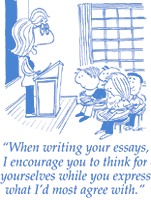
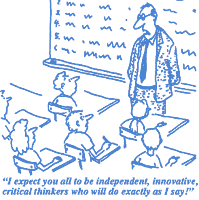
This site holds, with Maria Montessori, that this situation is not inevitable and that it exists only because of the way we treat children. She believed, that although young children sometimes acted like little barbarians, that this was not their natural or preferred state. This site and Maria share the belief that children do not want to be rude or upset adults, or for that matter other children. They do so, because on the one hand, they lack awareness that their actions are going to upset adults or other children, and on the other because they lack the social skill in performing actions that would not upset adults. Montessori believed that as soon as they became aware that their actions could upset others, they became highly motivated to learn how not to do this. She made a game of learning these important skills, and made the children aware of how much this could be appreciated by others. She challenged children to sit still for long periods of time. She had them become so quiet that they could hear their names called in the tiniest whisper. She challenged them to perform very simple tasks without making any noise. She demonstrated how they could blow their noses quietly. She taught them how to address various types of people correctly and politely. She basically allowed them to be curious, to be willing to try new things, to be in awe of and have enthusiasm for new things, and yet do it in such a way as it could not possibly offend adults. Thus her children remained enthusiastic and venturesome in learning while they remained with her. These ideas are as applicable today as when she come up with them. Mental flexibility in children is lost for a different reason. Children must be flexible because their map of reality is only partial and incomplete. They must be able to adapt, to change, and to change their minds, because they expect to be wrong or only partially right most of the time. However, as children get older and their map of reality approaches structural completion, it provides such an ability to predict most instances, that children can get the erroneous idea that it is infallible. Thus they lose their flexibility, and with it some of their ability to learn. The solution to this inflexibility, although not easily acquired, is attainable. The answer is to expose children as early as is possible to the idea of the impermanence of knowledge. Children (and most adults) do not wish to hear this of course, but if exposed to it consistently, they will find it although initially unsettling, eventually exhilarating. The fact that knowledge today is as likely to be superseded and thus wrong, as was the knowledge of yesterday, is born out by history. The importance of history (not the political history that most of us learned at school) but rather the history of knowledge, cannot be underestimated. Every subject whether "Science", "English", "Mathematics", "Geography" to name but a few, all have a history as certain changes were made in them over time as to what was accepted as being correct. While learning the complete history of all these subjects might take forever, a small smattering in each subject with continual reference to more, can play an enormous role in preparing and thus enabling children to remain flexible throughout their lives. Also, some subjects especially philosophy, are particularly adept at throwing us into doubt. This doubt is the most liberating kind of learning and will also help us to remain flexible. You may be tempted to think that this only true of some subjects like science and maths where people make new discoveries all the time. You may feel that other subjects like history itself is full of facts that are unchanging, immutable. It is true that history seems to change very little. But it is not immutable. History is part of the propaganda of each country, and to that extent, it varies widely from country to country. Then too, history is subject to change with changes in political philosophy such as were evident in Russia with its history of Stalin. History is also subject to fashion and new historians will grab on to accounts of events that support their own thesis and are thus interesting to themselves. Their choices as to what to present as history must always be somewhat arbitrary, being as they are taken from accounts which are often contradictory and where people may be lying or exaggerating or indulging in self aggrandizement. Lastly history does change when new writings or other discoveries come to light. For instance it was once believed that ancient Greece had a pure pristine white aesthetic with its marble temples and statues. It is now believed that this white was once covered with gaudy paint in blues and golds.
The Structure of Subject Matter. The only way we can successfully avoid all the above pitfalls of why children's ability to learn tails off is to let children learn what, when, and where, as they desire. It may be however, that years of schooling and other fragmented learning, often leave children without the ability to see how things are connected. Much of school type learning is like this. The only way to overcome this to try and learn about the same material in our spare time outside school, and indeed this exactly what some students who become truly interested in certain subjects do. For the rest of us, it is usually a matter of going through the motions without really comprehending. As is usual in schools, knowledge is broken up into subjects, but if it is not presented with concrete examples, it is disconnected from the rest of reality. This fragmentation of knowledge makes learning difficult and it makes remembering it even more difficult. John Holt in his book "What Do I Do Monday?", in a chapter on the wholeness of learning, takes us on a journey of discovery about mathematics, a subject that can quickly become disconnected from reality. Yet mathematics is essential for engineering, managing commerce and generally controlling reality at a basic level. John Holt explains how he felt he was often just going through the motions with mathematics and feeling something was missing. He says in part:
Holt then goes on to explain how he found in his adult life a series of books, by two people called Leiber, that he hoped would further his knowledge and somehow make sense of it relating it back to reality. As he made his way through this series of books he became more and more uneasy. He found he could understand it up to a point, but was still missing how to place it in the reality of his everyday life. Finally he realized that this was what was missing, how it was to be placed in his own map of reality. Reading a book on Galois he began to ask himself the following sorts of questions.
In short, I felt like saying to my patient and hard working guides the Leibers, 'Thanks for your help, but you haven't told me anything important, you've left out the best part.' Some years later, a former pupil and good friend of mine, then at college, was meeting with calculus for the first time. Like many people, he was having trouble. He had the feeling I had years before of being able to go through the motions, writing formulas and doing problems, but without any idea of what they were all about, seeing them only as a kind of mumbo-jumbo, meaningless recipes for getting meaningless answers to meaningless questions. He asked me one day if I would try to make sense of it for him. I said I would. I began by trying to give him a rough idea of the problem, philosophical as much as mathematical, that had started man on his search for the calculus. (What little I knew about all this I had picked up after I had left school.) So I talked about the Greeks trying to think about instantaneous motion, described some of the Paradoxes of Zeno - the arrow, Achilles and the tortoise, etc. At any instant the arrow is not moving, since motion is distance covered in time; but then, since time is made up of a sum of instants, how can motion be possible? It is easy to say, if a car traveled five miles in ten minutes, its average speed in that time was thirty miles per hour. But what does it mean to ask how fast is it going at any instant, and how can we find out? 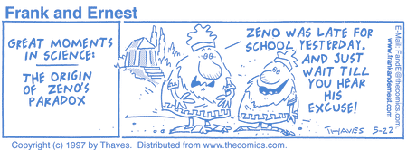 My friend saw the sharpness of the dilemma. I then showed how Cartesian or coordinate geometry made it easier to think about the problem, and prepared the way for men to solve it, by giving us a way to make a picture or map of something moving at various rates in space and time. We simply plot a graph of distance traveled against time. It could then be seen that the average speed between two points could be seen as the slope of the line joining them on the graph. From there we could see that the question: How fast is this object going at a particular instant?, could be asked as: What is the slope of the curve, or the tangent of the curve, at the particular point? We had then to find out what happened to that slope as the interval of time became smaller and smaller, and indeed what it meant to have something approach zero as a limit. My friend and I did some arithmetic, some algebra, derived the general formula for the differential at a point - all stuff he had had in the course. But now he said, 'So that's it. Why didn't anybody tell me that? It's so simple when you see what it's about. Exactly. What I had done, clumsily enough, was not to try to hand him a lump of knowledge, which people had already handed to him and which he could not take hold of, but to take him on a kind of human journey with people who had first thought about and discovered these things." What can we notice about what John Holt did? Firstly, it is showing the tentativeness of the search for calculus: The thinking, the problems, that led it to be invented. To do this he had to delve deeply into the history of mathematics and calculus, to show the step by step progress in the development of theories that eventually led to the invention of calculus. He had reiterated it, adding real meaning by supplying mental hooks whereby it could be linked to many other subjects. He had shown how it was linked to tangible problems in the real world and had given examples of what some of these problems might be. He had in fact, given calculus a place in his friend's map of reality, and in so doing had given it a place in his own map of reality. Thus it became part of the wholeness and interconnectedness of their learning or experience. He had also avoided many of the pitfalls that adults fall into, which enable young children to be better at learning than adults. Also, in so doing, the questions that he had asked about the theory of groups were answered about calculus. He had made it interesting; interesting because it connected with reality, interesting because it was useful, and interesting because it was an adventure involving real people. Finally, and perhaps most importantly, he showed how and why it was done. He pulled the veil away to reveal how and why knowledge comes into existence, and thus, how other knowledge might come into existence. Now you may be tempted to say, "But what was wrong with Holt's original lump of knowledge? Why is all this extra learning necessary? Surely it's just more work." The answer is this; every formula, every equation has a history and a reason for its existence. Each one is a simplification of something difficult, and we cannot understand the simplification, till we first understand the difficulty such constructions solve or make easier. Besides, Holt only had to explain so much because he had to find a place, where his friend, and probably he himself could connect with reality and begin to understand the process of calculus. You may then ask, "Do you mean we should have another separate subject to learn called the history of mathematics?" The answer is, "no no no." Anyone interested in the history and evolution of subject matter is advised to follow the biographies of that subject's greatest and most important contributors. To get some idea of what this might mean a good stating point is to read "Genius Explained" by Michael J. A. Howe. The history of any subject is about arriving at the clarity for that subject. It is about its context of time, place and social morays, about its connection with reality, and how such history needs to be a part of any explanation or exploration of those formulas or equations. For without it, the formulas and equations reduce to mere mumbo-jumbo or magic, for producing right, but meaningless answers to meaningless questions. Loss of Creativity in Adults. Creativity is also much weaker in adults than it is in children. In his book "The Power of Creative Intelligence" Tony Buzan offers up an experiment that shows a clear loss of creativity as children get older. He says: "A disturbing experiment, recently carried out in Utah, America, investigated the amount of Creative potential used by people at different ages. To research the 'Development' of Creativity throughout life, kindergarten children, junior school children, high school and university student and adults were surveyed to determine the amount of Creative potential used in tests. The results were traumatic!"
As to why creativity become much weaker as children turn into adults, the answer follows the same pattern as has been explained above. In his book Tony Buzan also supplies two very familiar seeming scenarios that quite adequately explain this gradual loss of creativity as follows: Art. "Try to remember back to when you were four years old in your first school . It is a lovely autumn day, and your teacher comes into the classroom and announces enthusiastically that today you are going to do your first lesson in art. You are very excited, because your mind is full of wonderful images, and you can't wait to express them on paper, which you have in abundance, as well as lots of wonderful rainbow-colored pencils and crayons with witch to create your first masterpiece! The teacher says, again enthusiastically: 'All right children, are we all ready? I want you to draw an airplane.' In your mind's eye you can see the airplane clearly, but the technique for getting it out of your brain and onto the paper proves to be a little more difficult. So at this stage, what do you, as a four-year-old, surrounded by your four-year-old friends each with their paper and colored pencils, naturally do? You will of course look around to see what the other children are doing. What will your teacher say to you when he or she observes you looking around? 'Stop looking at other children's work! That's cheating.' Frustrated you struggle vainly and disconsolately on, until the time is up. When you have 'finished' your work, you are then allowed to look around. And what do you see? Better airplanes! In fact, ironically, most children see better airplanes because they look at the worst parts of their own drawings, and the best parts of others' drawings. At this stage your classmates might come around and help you in your realization that yours is not a masterpiece of which you dreamed, and your Least Best Friend may say something like: 'That's not very good! It hasn't got any wings!' The pain and humiliation begin to gather momentum, and budding shoot of your creativity already starts to wither. Next comes more pain. For on the wall of your classroom, for the next two weeks, either is not your little airplane, and you are condemned by its absence, or (even more horrifying) is your little airplane, and you have to look at the blasted thing for two weeks. Its very presence reminds you every day of your incompetence, failure and non-realization of your fantastic dream. Sometime afterwards, your teacher comes into your class and announces: 'Children, we are going to do art again today. And what does your brain say? 'Noooooooooooooooooooooooooooooooohhhhhhhhhhhhhhhhhhhhhhhhhhhhhhhhhhhhh way!' Your brain will decide to flick pieces of paper or paperclips at the children who did good drawings, to pass messages to your friends, or watch the wonderful, artistic and creative world outside the window and daydream. Your brain will not want to do art. Why? Because it has already proved to itself that it cannot." Learning to draw is of course a mechanical skill, and if our hands and eyes work, we can all learn to do it quite proficiently. It is also not synonymous with creativity. However in our culture it is normal to think that you are not creative if you cannot draw well. What has happened in the above scenario is the development of a mental block against learning drawing. Unfortunately this block also leads you to believe that you are not creative and leads you away from practicing or performing any kind of creative activities. Tony Buzan also provides another scenario for the development of this kind of creative stifling. Music. "Once again, imagine a time when you were a toddler. It is a glorious Spring day, and you are playing with your friends in a blossom-filled park dotted with sandpits, swings, climbing-frames and the like, and with people out walking their dogs, meeting friends and basking in the beauty of Spring. The sheer beauty and exhilaration of the environment fills you with joy, and you and your friends rush about, experimenting with that fantastic musical instrument you are just beginning to discover: your voice. Each of you hits notes higher than any opera singer, finding how many ways you can produce each note, how long you can hold it, how loud you can make it and how much you can vary it. In the middle of this super-operatic symphony of sound, in which the dogs have enthusiastically joined, your mum and dad, and your friends' moms and dads, descend upon you and tell you not to shout, not to yell, not to scream and not to disturb other people. You learn that experimenting with your voice and exploring its extremes is bad and anti-social. A little while later you are in your class and are so involved in your work that you spontaneously begin to hum and sing. You are immediately told to stop it, and be silent while you work. You realize that music is to be disconnected from art, learning and productivity. A few years later, with a growing fear about using your voice other than in the most controlled manner, you are tested in your music class. Standing in front of your class, you are subjected to a public examination. With your neck and throat muscles tensed, and your mouth dry from fear, you are asked to repeat a note played on the piano. You rasp an approximation. It is 'noted' that your pitch is not good, and that your voice is not up to the standard of a school choir. As a result, whenever an important person visits the school, and the entire assembly has to sing the welcoming songs or hymns, you are told not to make a sound, but just mouth the words! Having had your musicality further restricted and crushed, you one day find yourself in the sanctuary of the bathroom, and while taking a shower you let loose your favorite tune or song. From downstairs comes the 'unkindest cut' of all: the yell: 'Will you please stop making that horrible noise!' You learn that even those you love are offended by your music." Anyone can help people to be able to learn later in life by not damaging them as children. The answers to our questions are there for anyone who wishes to use them. Why do children learn better than adults? Why do people have to unlearn material? Why do people become blocked against learning certain material. Why is there a marked falling off intellectual enthusiasm, venturesomeness and flexibility as children get older? The fact is children do not learn better than adults. Adults have many advantages. Children simply have the advantage of not yet being damaged by parents, conventional schooling and general cultural socialization. Adults may have to unlearn material before they can learn new material. They have to do this because it has been etched into their minds as if it were the word of god. If children were not forced to learn as if everything they were learning were gospel; if it was not hammered into their minds by repetition; then they would not have to unlearn it as adults. Thus they could learn better and faster as adults. Adults may find it impossible learn certain material because they have built up painful associations with such when they were children. If children were not forced to learn things they did not want to learn, they would find it easy to learn later in life when they do want or need to learn. "What are the conditions of the creative attitude, of seeing and responding, of being aware and being sensitive to what one is aware of? First of all, it requires the capacity to be puzzled. But once they are through the process of education, most people lose the capacity of wondering of being surprised. They feel they ought to know everything, and hence it is a sign of ignorance to be surprised or puzzled about anything." Eric Fromm Creativity, curiosity, enthusiasm, intellectual bravery and flexibility all tend to become stifled in most adults, all of which makes learning slow and difficult for them. If, as children, these people had not been prevented from indulging in these activities and punished for indulging in them, as adults their learning abilities would far outshine children, for they would still be creative, curious, enthusiastic and intellectually brave. Knowledge, data, ideas, the stuff that we learn, has to connect with what we know already. Learning is like sealing the two sides of Velcro. Knowledge when acquired correctly has thousands of little hooks on it, and our brains or minds have to catch those hooks in thousands of little loops. We need to know how knowledge came into existence in order to truly know it. We need to know where it came from, why was it needed, what it was for and what it might be used for. Indeed we need to have some practice in using it. If we could learn like this when we were children, as adults further learning would follow naturally and easily as we would really understand and remain intellectually flexible. "From the moment of birth, when the stone-age baby confronts the twentieth-century mother, the baby is subjected to these forces of violence, called love, as its mother and father have been, and their parents and their parents before them. These forces are mainly concerned with destroying most of its potentialities. This enterprise is on the whole successful." R. D. Laing
Information and knowledge. This site is all about the importance of learning. That said however, it must be understood that the learning talked about here is not just about the taking in of information. In fact, knowledge as presented here is not just information at all. Knowledge is information that connects with our internal model of reality. It is that which is meaningful because of its inner connectivity and how it connects in many places when it is added to our inner model. More importantly, it is that which corrects and replaces our inner models, enabling those models to grow and become truer models, better templates, and more efficient maps of the universe about us. Information addiction. But there is a problem. Our brains are not just producers of intrinsic enjoyment that comes from actively learning. Our brains produce a pleasurable experience whenever we are exposed to information of any sort. This pleasure derived even from fragmented information is like that provided by an addiction. It requires no effort but the thrill from it lessens with time requiring ever greater amounts of information to produce the same high. But we needn't worry that we might become strung out, unable to get our fix of information. The fact is, the media in modern society constantly bombards us with useless and unconnected and not comprehended information, all the time. The more we just sit there passively, just soaking up this information and the pleasure it provides, the more we want to. This desire for unchallenging, un-useful information fits well with the passive nature we derive from our experience at school. It must somehow be overcome. But the easiest way to overcome it, is to never become addicted. If we can feel the pleasure, that comes with challenge, understanding and meaningful learning, when we are children, this addiction will never appear. External influences. In an world where there were no external influences only our belief in ourselves would affect whether we learned new things and accomplished thing in the world. With each lesson learned we would not only reach a higher state of knowing but we would also increase our potential to know even more. However, society, schools and even our friends and family often seem to cripple our belief in our ability to learn and accomplish things in the world. As explained above we are beset by external influences. Learning blockage. External influences can cause us to build up such unpleasant associations with particular types of subject mater. Society, schools, employers, even our friends and family can (often by forcing us to learn) build up in us such unpleasant associates with specific subject matter that not only do we have no desire to learn it, we actively avoid it as we we find it unpleasant to even think about it. We have become blocked from being able to learn those areas of knowledge. We hate and avoid these areas of knowledge. Dogmatic blockage of unlearning and unnecessary unlearning. Most learning requires some unlearning in that any new knowledge is actually an update of knowledge we have already stored away. However, external influences tend to cause us to learn things that are already known to be wrong. This makes necessary a lot unlearning that should never have been necessary at all. On top of that society, schools, employers, even our friends and family often cause us to learn many things in such a dogmatic fashion that it makes the unlearning of that knowledge very difficult. It could be said that we are often taught in such a way as to make us rigid and inflexible in our beliefs. This blocks us from being able to unlearn old outdated knowledge and replace it with new better updated knowledge. Degraded venturesomeness. Society, schools, employers, even our friends and family can cause us to loose interest in subject matter that we were once interested in. External influences cause us to give up on learning certain types of knowledge. Society, schools, employers, even our friends and family by their lack of faith in our ability to learn certain subjects or succeed in them lead us to give up on subjects without even trying to see if we are interested in them. Society, schools, employers, even our friends and family often dissuade us from building on new interests because the see them as unimportant or a distraction from subject they consider important. This all tends to make us timid and lacking in venturesomeness in our learning. This causes our learning to shrink in an ever decreasing spiral. In a worst case scenario this can shrink to such a degree that no new learning can occur. Overcoming blocked learning. To overcome these external influences we need to reshape society, schools, employers and familys in such a way that they make all learning experiences pleasurable. This is not difficult as learning is naturally pleasurable. In the end it is just a matter of avoiding the build up of unpleasant experiences in learning environments. Overcoming blocked and unnecessary unlearning. To overcome these external influences we need to reshape society, schools, employers and familys so that outdated material is replaced with updated material before learners are ever exposed to it. Also the subject matter should be taught in such a way as to make clear that the knowledge is theoretical and tentative in nature thus allowing it to be easily replaced by updates as they occur and making unlearning where necessary easy to perform. Overcoming degraded interest and curiosity. To overcome these external influences we need to reshape society, schools, employers and familys so that we never lose interest in subjects we are interested in. Similarly we should never be dissuaded from learning any subject as there is no subject we cannot learn. Institutions and people must be made to see that they are not helping us by deterring us from learning a subject. It is never in our interest to believe that there is some subject we should not learn or that we are incapable of learning. Finally we should extricate ourselves from environments that tend to reinforce the idea that there are things we should not or cannot learn Instead we should seek to place ourselves in environments that help consolidate the idea that we or anyone can learn anything if we put in sufficient time and effort. Learning to love learning and learning anyone can learn anything. Why do some people seem so much more capable than others? If anybody can learn anything why is it that some people seem to learn fast while others seem to learn so slowly that they are often credited as not learning at all? This is a good question and it has two answers. Reason one structure. What a person is capable of learning is dependent on what that person has previously learned. This in turn affects the speed at which they can learn. A person who knows little about a subject needs to first learn the underpinnings or foundations of the subject before he/she can understand any new material. On the other hand a person who knows a lot about a subject is already familiar with its foundations and any other structures in the subject necessary to support the new information and make understandable that new material. A person who knows little about a subject may need to learn twice or three times the material in order to understand new material. Also often that extra supporting material is not being taught and must be researched by the learner. The person who knows little about a subject not only has much more to learn, but is also in a position where it is difficult to learn the extra material that needs to be learned. Reason two belief. The second reason that some people seem to learn slowly while others seem to learn fast is to do with what each learner believes about learning and whether or not they believe they are capable of learning specific material or subject matters. Also what each person believes about their ability to learn specific subjects is in turn dependent on outside influences. What each person believes about their own ability to learn specific subjects depends on what the society in which they live impresses on them. It also depends on what their schools and teachers convey to them. It depends on what their employers, their friends, and their families assume and impart to them. Indeed their beliefs are shaped by any who come in contact with them, some to a greater degree and some to a lesser degree. This all affects both what they can learn and the speed at which they can learn it. Are the differently enabled limited? What about the differently enabled? It may seem obvious that we are all conceived or born unequal. Many people are born with deficiencies. They may be born blind or deaf or their brains may still be missing important brain functionality. Even if people are born perfect they may lose their sight or hearing or even part of their brain. But even those people are not limited in what they can learn or accomplish. It may take them longer, or they might have to work harder, but they will be able to learn whatever they set their mind to. Of course some people are so badly damaged they they cannot recover. They may have to work so long and hard that they become discouraged and just give up. These are so very few and almost none of them have no alternative but to give up. What limits most of these people and indeed all people is their own belief in their ability to learn and what others around them believe they can learn and accomplish. In other words in the end is is there own decisions to continue to struggle or to give up on learning something that decides whether they will learn it or not. There are of course exceptions but ones that are only limited by the current state of technology. It may seem obvious that you cannot learn to run if you have no legs but the future may bring prosthetic legs or the ability to grow new legs. People paint that cannot see and compose music that they cannot hear. If the differently enabled can do all that the average person must be able to learn or accomplish anything. Prodigies, geniuses, or so called gifted people. Prodigies, geniuses, or so called gifted people are essentially an illusion based on false beliefs that some people come into the world with a gift or talent that gives them an enormous advantage in life and that the rest of us have to be content with the little we are given and not try catch up to or surpass the these talented or gifted individuals. This is not only not true but it is dangerously untrue. People come into this life knowing nothing. Infant learning seems so miraculous because of where they start. It also explains why humans are so much more malleable the younger they are. Prodigies. Prodigies may come into the world with some slight advantage but their ability to learn is normally no greater than anyone else's. They simply learn early, and the more they learn the more they find they can learn. Each prodigy knows more than others of a similar age group, in a few subject areas. It is this knowledge that gives them an advantage in that the more they know the more they believe they can know. Acquiring knowledge early in life. It might seem strange that many young people can acquire this early knowledge in various subjects there are several reasons why this tends to happen. The simplest reason is that some children grow up in very stimulating environments. They might grow up surrounded by books or surrounded by parents and other family members who love learning and contently discuss academic subjects and other interesting things. Some children are simply curious and driven to learn as they become interested in various subjects. Then too some parents actively push their children to learn early in various fields. This is often the case with chess prodigies, music prodigies and dance prodigies. But perhaps the most important way prodigies can be produced is for them to grow up in an environment where they are never told that there is something they cannot or should not learn. An environment where they are repeatedly confronted with the idea that they or anyone can learn anything given sufficient time, effort and hard work. Prodigies advantage versus burn out. Burn out. This seeming initial advantage of so called prodigies does not mean they cannot be caught up to or surpassed, and indeed they often are surpassed by more average young people, because many so called prodigies burn out. They burn out because they are as prone to being influenced by others false beliefs as are the rest of us. It might seem counter intuitive that telling someone that they are smart could contribute to there eventual burn out but this happens and happens in a dramatic way when we tell young people they are super smart, super talented, gifted young people. It can cause them to suffer from impostor syndrome where they are pretending to be smart. They can become obsessed with how others view them as being smart and how smart they are believed to be. This can lead them to avoid situations where they could be exposed as performing badly. It can lead them to think that effort and working hard is for people who are not smart and that they as smart people should never make much effort or work hard. All this leads to a gradual decline in learning which can lead to slower learners catching up to them and surpassing them. Burn out is not inevitable. Burn out usually happens later in life but it happens because of what the person learned early in life. Having an advantage early in life can provide the illusion that people who have such advantages are somehow better, do not need to work as hard and in fact should not work hard because it would expose that they are not so clever at all. This leads to such people not working hard till they finally fall behind. They are surpassed by people that do work hard. They burn out because they finally realize they are not superior. Because they have never built up the habit of working hard they cannot overcome obstacles that fall in their path. On the other hand people who have built up the habit of working hard do it easily overcoming each obstacle that falls in their path. 1 We can learn anything. What infants and children need to learn as early as possible is that anything can be learned if only they put in enough effort. Yes anyone can learn anything but at a cost and that cost is effort and hard work. For many people this may provide a problem as they may not be naturally motivated to learn. As discussed above they may be motivated to try and appear to be intelligent rather that being motivated out of curiosity and interest. What we need to learn to avoid burn out. This can be be accomplished in two ways:
2 All learning can be fun. The other thing infants and children need to learn as early as possible is that learning is pleasurable and fun. Of course we all do learn this naturally but many forces in society tend to crush natural curiosity and stifle initial interest before it can flower into a strong intrinsic motivation. Parents, often crush curiosity and initial interest because they believe it is taking children's attention from other material that they believe the child should learn instead. Similarly the institutions of learning, teachers, friends, pears and employers are all often guilty of crushing curiosity and interest. One way to deal with this is, where ever we can, we should do the opposite. We should encourage curiosity and act as midwifes to burgeoning and fragile interests. What we need to learn that makes learning fun. This can be be accomplished in two ways:
Challenge. Learning and accomplishment are the feelings that create in us intrinsic motivation. But they are only exist in so far as what we learn is challenging or difficult to learn or accomplish. The things that we learn or accomplish easily, give us little pleasure. When things are hard, when they are difficult or challenging and we learn them or accomplish them, then we feel the immense pleasure that comes from overcoming challenges and having done something that was incredibly difficult to do. We mainline the pure intrinsic desire to learn or accomplish. Lifelong learners. If it was possible to somehow avoid losing intellectual enthusiasm, venturesomeness and flexibility; If it was possible to avoid having to unlearn data; If it was possible to avoid building up mental blocks; if it was possible to come to prefer the pleasure of active engagement in learning and avoid the sedentary pleasure of amassing useless bits of information; then we would all have a chance to become lifelong learners. We could all become people who remain interested, and continually become interested in more and new forms of learning throughout our lives. While it is not completely possible to accomplish all of the above it is certainly possible to to avoid many of the pitfalls that often ensure that intellectual enthusiasm, venturesomeness, and flexibility are crushed in our early lives. This is possible. If we could manage to retain these qualities it would lead to world where most people are able to become life long learners. It is also possible that if society, schools, employers, friends and family could be reshaped to promote young people's belief that they can learn anything given sufficient time and effort, then these young people would come to believe themselves that they can learn anything. If most young people became convinced that they could learn anything they could not help but become life long learners. "I hope that each and every one of you remembers Galileo. Not necessarily his lectures, but his lessons and life. For as grand as all of Galileo's discoveries and contributions were, I think his example - what motivated him to live his life the way he did - was really quite simple. He was committed to lifelong learning." Daniel S. Golddin former director of NASA "Anyone who stops learning is old, whether at twenty or eighty. Anyone who keeps learning stays young. The greatest thing in life is to keep your mind young." Henry Ford |
Needs Interest Method Reality Keys How to Help Creative Genius Future What is Wrong Theories Plus
Thin Slicing Expertise Self Determination Self Theories Iteration



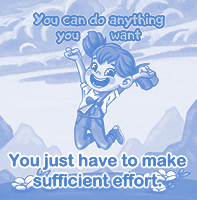


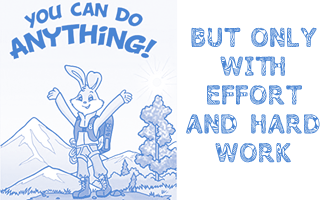
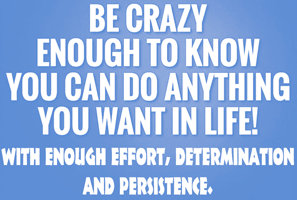

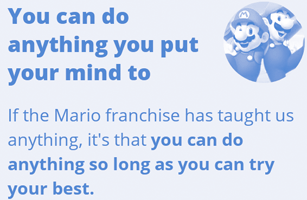
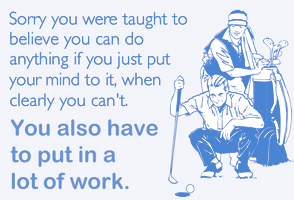
 Three Questions. Three
Answers.
Three Questions. Three
Answers.



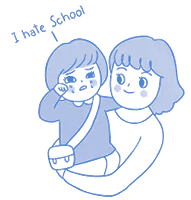
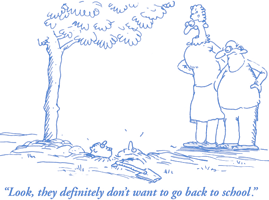
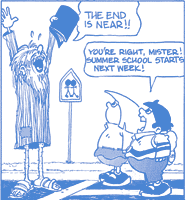








 The Wholeness and
Interconnectedness of Learning
The Wholeness and
Interconnectedness of Learning
